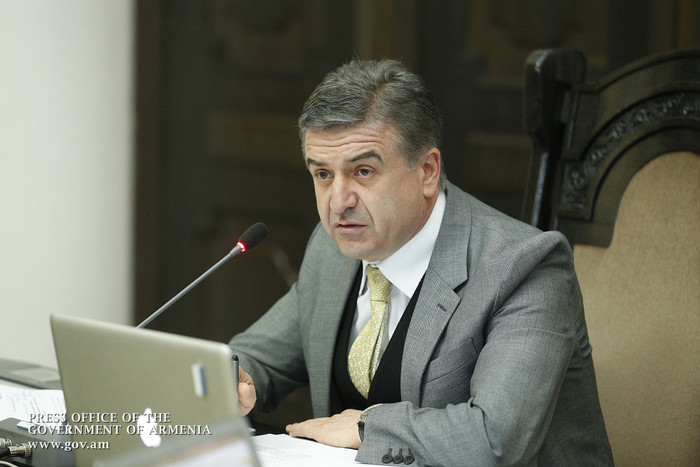Prime Minister Karen Karapetyan visited Ministry of Education and Science to get acquainted with the ongoing reform and optimization programs and discuss current problems with ministry officials.
The Prime Minister was told that a school staff workload study had been carried out over the past few months and an optimization program was submitted to the Government. It was noted that there are 1385 schools operational nationwide, with the total area of buildings available standing at 4 million 674 thousand 850 square meters. The number of teachers is 36807, while pupils are 52357 thousand.
The studies have shown that urban schools are either under-loaded or overloaded: 33.7% is under-loaded, 35.8 percent – overloaded. The number of schools with a normal load is 16.3 percent. In this context, it was emphasized that schools need leveling, load sharing and optimal management of unused areas. Optimization programs have been developed for 20 schools. The speakers noted that the existence of urban schools with less than 300 students will be ruled out in the future. The minimum number of students in a single school will be 450.
Welcoming the digitization of the school system, the Prime Minister said it will facilitate the activities considerably. “But if we consider that 450 is the optimal number of pupils, why are we switching over gradually? In individual cases, the number of pupils shall be reconsidered firstly in cities. We need to solve the following problem: we are spending money on education; we know that it is not too much, but still we have instances of bad spending on distribution, fixed costs etc. In this respect, we should have a national program, according to its vision and move forward. Optimization is an imperative. It will enable us to provide bonuses in order to increase teachers’ salaries and raise wage rates in border settlements and, in general, cope with different problems,” Karen Karapetyan said instructing those responsible to revise the estimates and submit an action plan.
The Prime Minister also stressed the need to clearly define the student-teacher ratio and other standards in the school system. The meeting next discussed the program on review of school funding schemes. The distribution in spending was said in need of revision, which will raise the average salary for teachers, guaranteeing them a minimum wage regardless of the number of students. Reference was made to the content of education reform, namely the Ararat Baccalaureate program, which plans to introduce new curriculum guidelines, new educational standards, provide for teacher training, revise textbooks, introduce a new concept of teaching of foreign languages, etc.
It is planned to create a network of schools with a bias on Physics and Mathematics starting 2018, which will provide training in four main subjects. The schools will be included in the network of labs and engineering projects. The meeting was also informed on the introduction of financial education and entrepreneurship-related subjects in secondary schools. Thematic areas were said to have already been determined in five subjects with the support of international experts. These subjects will be taught starting from the next academic year for students in grades 2-12.
In this connection, the Premier stressed, “I am convinced that if we want to have a developing country, we should try to get the most out of business training and financial education. These subjects arouse interest among schoolchildren and motivate them to learn the necessary skills before being introduced to the modern world.”
The meeting also discussed the reform of graduation exams, the need to improve teachers’ skills and issues related to school catering programs. It was reported that in line with the Prime Minister’s instruction, interactive courses are being held in several schools, especially in rural communities where there is a lack of teachers.
Vocational and technical education programs are also envisaged, in particular, the European Union will support the establishment of 8 modern agricultural colleges in Armenia. The project will have total cost of 13 million euros. Optimization programs are being implemented in this system to result in AMD 42 million in overall savings.
The meeting went on to review the process of reforms in higher education. A new draft law on higher education was said to have been developed and submitted to the Government, which provides for stricter terms of licensing in this field, clear deadlines, program accreditation, increased university autonomy, age limit for university leadership, new scholarship schemes, etc.
With reference to preschool institutions, Prime Minister Karapetyan instructed to study the best practices and submit recommendations on introduction of a contemporary model.
Concluding the meeting, Karen Karapetyan highlighted the need for choosing the right path of educational reform. “I am sure that with a good educational system we will have a better country. This is a fact and, in this regard, I am extremely concerned about the right path to take.”




















































